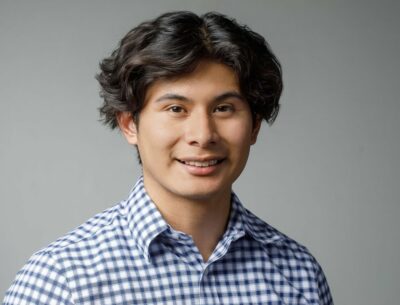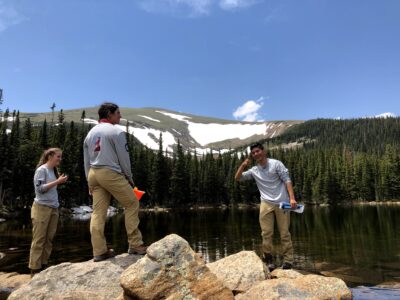Posted on May 16, 2023 by Rebekah Alegria
 Searching for the American dream, Lazaro’s parents left their hometown of Huitzuco in Guerrero, Mexico at 18 in hopes of a better life. Despite his parent’s demanding jobs as a house cleaner and a construction worker, they provided Lazaro with endless support, helped him develop an affinity and passion for mathematics and instilled in him the persistence to pursue a degree in higher education.
Searching for the American dream, Lazaro’s parents left their hometown of Huitzuco in Guerrero, Mexico at 18 in hopes of a better life. Despite his parent’s demanding jobs as a house cleaner and a construction worker, they provided Lazaro with endless support, helped him develop an affinity and passion for mathematics and instilled in him the persistence to pursue a degree in higher education.
Originally a cyber security major, then an environmental science major, Lazaro did not have many academic inspirations or connections growing up as a first-generation student and Mexican American. It wasn’t until he became more involved at UTSA in different organizations, like the American Statistical Association (ASA), that he discovered his true academic passion.
After attending his first ASA meeting and hearing guest speaker Henry Miller, computational biologist, speak about the usage of statistical modeling in biological systems to help identify where tumors are in the body, Lazaro’s career path shifted.
“I did not know that you could combine statistics with biology and computer science and get meaningful results for the future of cancer research. That is what really inspired me to pursue a passion in statistics and data science,” said the graduating senior.
During his time at UTSA, Joshua continued his involvement with ASA as well as the Association for Computing Machinery (ACM), where he served as president of a minority student chapter in ACM.
While encouraging current students to get involved, Lazaro’s biggest takeaway from his student organization experience is to try everything you can, even if it does not correlate with your degree program.
“I believe students cannot be what they cannot see. If they see someone doing something unique, like how I was able to learn about bioinformatics from the guest speaker in the ASA meeting, then students will see what they can become and open their eyes to endless opportunities,” stated Lazaro.

Knowing much about career exploration because of his own experiences, Lazaro’s first internship was with the Rocky Mountain Conservancy’s Conservation Corp in Colorado. Though not pertaining to his current degree, Lazaro values the unique opportunity he had to conserve nature trails and work outside while the world was shut down during the COVID-19 pandemic.
The next year Lazaro accepted an internship at the Stanford School of Medicine, where he practiced bioinformatics and utilized machine learning algorithms. The following summer he conducted cancer research at the Yale School of Medicine under the Medical Research Scholars program.
Upon graduating from UTSA, Lazaro will be working at the Center for Disease Control and will be attending the Stanford School of Medicine to obtain his Ph.D. in Biomedical Informatics.
Reflecting on his UTSA journey thus far, Lazaro admires the strong Hispanic culture that the university embraces. Growing up in the small town of Magnolia, Texas, he and his family were some of only a few Spanish-speaking residents. The embracement of the Hispanic culture, along with the accredited programs at the Carlos Alvarez College of Business, are what ultimately led him to choose UTSA for his undergraduate degree.
Finishing off his studies strong, Lazaro acknowledges integral faculty and staff members who have made his journey a successful one. He credits Jerome Keating, professor of management science and statistics, as one of his favorite professors and mentors in the statistics department. He also was impacted by Margarita Gomez and Patricia Sanchez of the Bicultural and Bilingual Studies Department for being imperative to his and other first-generation students’ success.

